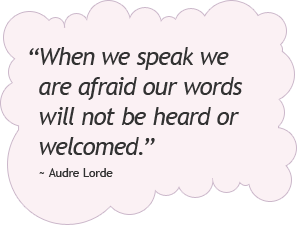The Cycle Of Abuse
ABUSE - Your abuser lashes out with aggressive or belittling behavior.
EXCUSES - You begin to make excuses for your abuser's behavior. You may even believe your excuses and that you can change your abuser

APOLOGIES AND PROMISES (Honeymoon Phase) - After abusing you, your partner feels guilt, but not over what he's done. Your partner is more worried about getting caught. The HONEYMOON phase may give you hope that your abusive partner has changed - this time!
ROUTINE BEHAVIOR - The abuser does everything they can to regain control and keep you in the relationship. Your partner may act as if nothing happened, or can turn on you in any instant.
FANTASY AND PLANNING/TENSION BUILDING - Your abuser begins to fantasize about plans for abusing you again.
SET-UP/TRIGGER- Your abuser sets you up and puts the plan into action thus creating the perfect situation where he can begin abusing you again.


Remember
you cannot change your abuser, and in time it will only get worse. You need to take care of yourself.
SAFETY PLAN
If your safety is at risk, create a safety plan with a trained domestic violence counselor to keep yourself safe and find the support you need.
You can consider including the following when safety planning:
- If you live with your partner, try and leave your home regularly during the day. Whether you go to school, work or to the store, try to establish and maintain a regular routine. This might help you leave without drawing attention to yourself.
- Learn the best route to get to a safe location. If you have a car, keep your gas tank full and if you rely on public transportation, learn which buses, trains, or subways will get you to safety.
- If you need a place to stay, contact the National Teen Dating Abuse Helpline at 866-331-9474 or a local domestic violence center.
- Talk to a friend or adult you trust.
-
At school you can:
- Change your locker
- Change your route to/from school or work
- Use a buddy system for going to school, classes, after school sports or activities.
- Keep a journal describing abuse.
- Document all incidents (emails, texts phone calls, letters, etc)
- Only have conversations or meet your partner in public or with someone.
Try to plan ahead and keep these items ready to take with you:
- School ID
- Cash/ATM cards/checkbook
- Drivers License/Passport/Government ID's
- Medications
- Eyeglasses/Contact lenses
- Cell Phone
- Keys
- Legal documents, like a restraining order
- A change of clothes
NOTE: The decision to leave your boyfriend/girlfriend is hard to make. For many people, the break up is the most dangerous time in an abusive relationship. Emotions are running high and your partner might even become angry, even violent, when they learn they are losing control. Finding support at this time is crucial.
Here are some Additional Suggestions
- Call the National Teen Dating Abuse Helpline at 866-332-9474 and talk to someone that is trained to be able to help you plan ahead and remain safe after you have ended your relationship.
- Talk to someone you trust, such as a friend, family member, teacher, or coach.
- Choose a code word and use it to discretely tell the people you trust that you are in danger and need immediate help.
- Pick in advance a safe and secret location where a friend or family member can pick you up.
- If you don't feel safe, don't break up in person. If you decide to break up in person, do it in a public place and ask someone you trust to be nearby in case you need them.
- Trust your instincts...if it doesn't feel right, it most likely isn't.